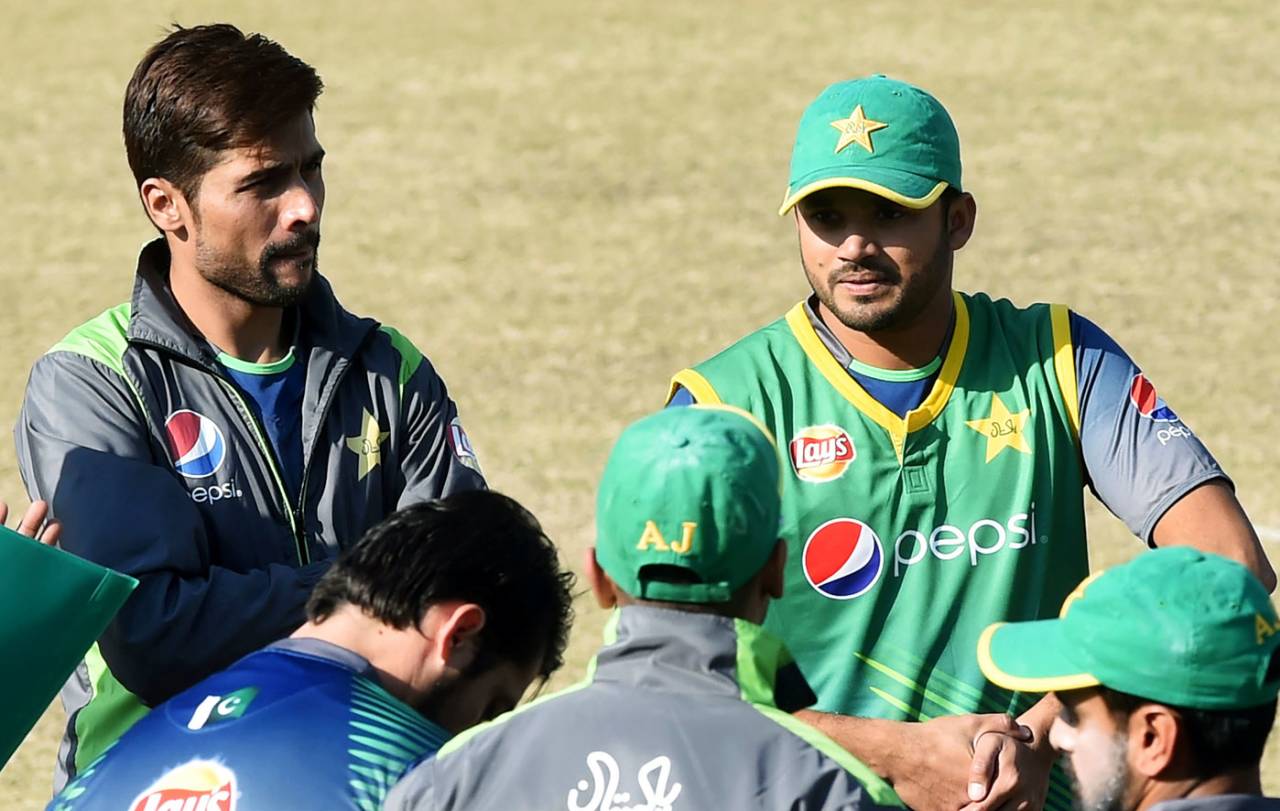Can Pakistan find redemption on fixing?
A contemporary film provides parallels with what's going on with regard to Mohammad Amir's return
Ahmer Naqvi
Jan 4, 2016, 7:24 AM

To find closure on match-fixing, Pakistan cricket needs to actively discuss the problem and deal with continuing rumours • AFP
One of the highlights of 2015 in Pakistan was the release of a number of commercially and critically successful films, in what is still a nascent industry. One of those, Moor, the country's submission for consideration in the Academy Awards, centres around the moral choices of a father and son in the aftermath of their wife/mother's death.
According to one reviewer, the film manages to update the classical South Asian cinematic theme of "love for the country" in a modern setting. The question of what it means to love the country was frequently invoked over the past few weeks in Pakistani cricket circles after it emerged that Mohammad Hafeez and Azhar Ali, the latter the ODI team captain, had refused to play in the same team as the soon-to-be-re-included Mohammad Amir.
The moral debate inspired by this development reminded me a lot of the one in the film, and I thought it might be helpful to view life through art. (There are major spoilers ahead, so please be warned.)
In the movie, Wahidullah Khan is a stationmaster at the literal and figurative fringes of the Pakistani state, and has the chance to participate in the illegal sale of the colonial-era railroad's resources. His former subordinates as well as his brother pester him to make the deal, even at his wife's funeral. As we learn, she had strongly rebuked Wahid for even considering such a deed right before she died.
The son, Ehsanullah Khan, moves to Karachi at a young age and pulls himself up from the bottom to a position of middling aspiration. After having been busted in a scam involving fake educational degrees, he sets up another, arguing that in a city like Karachi one doesn't have the luxury of contending with morals. An argument implicit here is his belief that his father's apparent decision to sell off the land and rail tracks had a part to play in his mother's death, thus giving Wahid no grounds to make any judgements about his son's life.
The film ends with redemption for both characters, but it comes at different prices. Ehsan has the first of his breakthroughs when his actions lead to someone's death, and he eventually reconciles with his father, and marries his patient, one-dimensional love interest. But for Wahid, redemption involves turning in his brother and acquaintances, and hence calling out the entire illegal operation.
Amir apparently reached out to Hafeez and Azhar and soon there were hugs and tweets. The redemption here hinted at seeking forgiveness and conformity with the larger family
The problem with the issues that have been raised by the impending return of Amir is that redemption for the player - as evidenced by events - has been far simpler than redemption in terms of fixing at large, one that Pakistan's cricketing community has still not found.
Let us deal with Amir first. For much of the last five years, the conversation revolved around his age, his naivety and his admission of guilt. Over the last few months, as he began to strut and prepare for re-entry, many insiders pointed to his repeated petulance over the entire affair and his reluctant, legally enforced remorse. There were reports that many in the squad had serious issues with the return of any of the spot-fixing trio, and that Amir being allegedly preferentially treated by the PCB had made the grudges worse.
Hafeez's and Azhar's outbursts brought everything out in the open, but as far as they were concerned, the matter has been resolved swiftly. Like Ehsan, Amir had spent a long time finding moral loopholes in the situation. However, in a climax that had more drama than the film, Amir apparently reached out to the pair (and allegedly broke down at the National Cricket Academy) and soon there were hugs and tweets and refused resignations. Like Ehsan, the redemption here hinted at seeking forgiveness and conformity with the larger family. Soon enough, a whole host of others spoke out in favour of Amir, and we seem to be beginning to move on.
But for Pakistani cricket to truly find closure, it needs the redemption achieved by Wahidullah Khan, which looked to end the greater evil. The Qayyum Report and the efforts of that era had offered the best chance, but it was spurned by an official directive that didn't commit one way or another. Even now, there has been little frank discussion of the continuing rumours of fixed matches - then and now - and that omertà leaks out from Pakistan to much of the cricket world. There is no doubt that much has been done to prevent a return to the bad old days of the past, but the issue has never truly been resolved.
As I wrote this, there were reports that the tiny crowd at the domestic final in Karachi had yelled out the name of Amir (who wasn't playing for either side) when Azhar and Hafeez walked out to the field. Did the crowd represent hypocrites who preferred fixers over patriots, or was it a knowledgeable rebuke of players overstepping their bounds over someone who had served his time? It was most likely a mix of both, topped off with rowdiness, but clearly the issue is far from being resolved, and thus Pakistani cricket is no close to finding redemption on the issue of fixing.
Ahmer Naqvi is a journalist, writer and teacher. He writes on cricket for various publications, and co-hosts the online cricket show Pace is Pace Yaar. @karachikhatmal